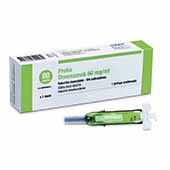
Wednesday, 20 June 2018  |
|
|
|
Almost one third of spine surgeons do not routinely use patient-reported outcome measures (PROMs), Asdrubal Falavigna (Department of Neurosurgery, Caxias do Sul University, Caxias do Sul, Brazil) tells audiences at the Global Spine Congress (1–5 May, Singapore). The research received the prize for Best Paper.
|
|
|
|
|
|
A preliminary study has demonstrated the feasibility of using a novel visualisation approach as a valuable adjunct tool for minimally invasive percutaneous procedures. This is the conclusion of Gerard Deib (Baltimore, USA) and colleagues following a feasibility study, recently published in The British Medical Journal (BMJ).
|
|
|
|
|
|
The use of a hydrogel after spinal cord injury is responsible for the restoration of independent breathing control in rats, according to The Journal of Neuroscience published research. Researchers Angelo Lepore and Yinghui Zhong (both Philadelphia, USA), developed a gel that binds to the neuro-stimulating agent brain-derived neurotrophic factor, and releases this nerve-repair protein at the site of injury.
|
|
|
|
|
|
Highlights:
- Percutaneous vertebroplasty does not result in statistically significant greater pain relief than a sham procedure, VERTOS IV trial concludes
- Bruce Dall argues patients are suffering due to spine societies' neglecting education on the sacroiliac joint
- Martin Underwood claims spinal surgery is an inappropriate intervention in the treatment of non-specific low back pain
- Case report: A complex adolescent idiopathic scoliosis case, and the influence of the NSpine Winter Masterclass
- Profile: Raja Rampersaud
|
|
|
 |
|
The latest line of icotec interbody cages, designed to optimise bony integration and post-operative visualisation, has received US Food and Drug Administration (FDA) 510(k) clearance.
|
|
 |
|
The commercial launch of Fortilink-TS and –L IBF systems (RTI Surgical) with TETRAfuse 3D technology has added to a growing series of interbody fusion devices featuring RTI Surgical’s proprietary TETRAfuse 3D technology.
|
|
 |
|
The European Commission (EC) has approved a new indication for Prolia (denosumab) for the treatment of bone loss associated with long-term systemic glucocorticoid therapy in adult patients at increased risk of fracture.
|
|
|
|

